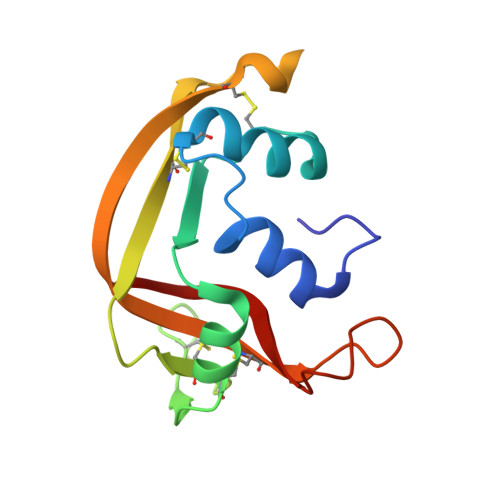Crystal Structures of Eosinophil-Derived Neurotoxin (Edn) in Complex with the Inhibitors 5'- ATP, Ap(3)A, Ap(4)A, and Ap(5)A.
Baker, M.D., Holloway, D.E., Swaminathan, G.J., Acharya, K.R.(2006) Biochemistry 45: 416
- PubMed: 16401072
- DOI: https://doi.org/10.1021/bi0518592
- Primary Citation of Related Structures:
2BZZ, 2C01, 2C02, 2C05 - PubMed Abstract:
Eosinophil-derived neurotoxin (EDN) is a catalytically proficient member of the pancreatic ribonuclease superfamily secreted along with other eosinophil granule proteins during innate host defense responses and various eosinophil-related inflammatory and allergic diseases. The ribonucleolytic activity of EDN is central to its antiviral and neurotoxic activities and possibly to other facets of its biological activity. To probe the importance of this enzymatic activity further, specific inhibitors will be of great aid. Derivatives of 5'-ADP are among the most potent inhibitors currently known. Here, we use X-ray crystallography to investigate the binding of four natural nucleotides containing this moiety. 5'-ATP binds in two alternative orientations, one occupying the B2 subsite in a conventional manner and one being a retro orientation with no ordered adenosine moiety. Diadenosine triphosphate (Ap3A) and diadenosine tetraphosphate (Ap4A) bind with one adenine positioned at the B2 subsite, the polyphosphate chain extending across the P1 subsite in an ill-defined conformation, and a disordered second adenosine moiety. Diadenosine pentaphosphate (Ap5A), the most avid inhibitor of this series, binds in a completely ordered fashion with one adenine positioned conventionally at the B2 subsite, the polyphosphate chain occupying the P1 and putative P(-1) subsites, and the other adenine bound in a retro-like manner at the edge of the B1 subsite. The binding mode of each of these inhibitors has features seen in previously determined structures of adenosine diphosphates. We examine the structure-affinity relationships of these inhibitors and discuss the implications for the design of improved inhibitors.
- Department of Biology and Biochemistry, University of Bath, Claverton Down, Bath BA2 7AY, United Kingdom.
Organizational Affiliation:


















